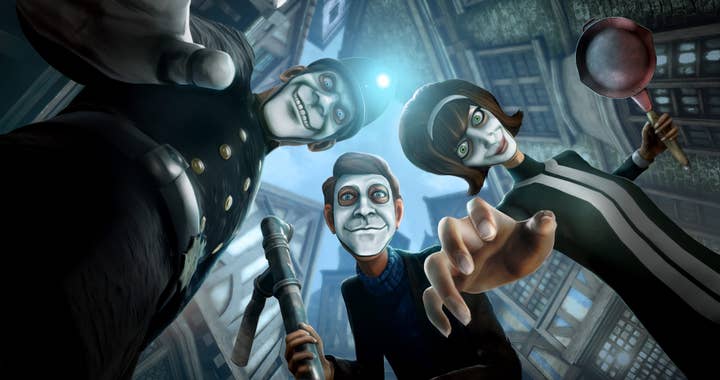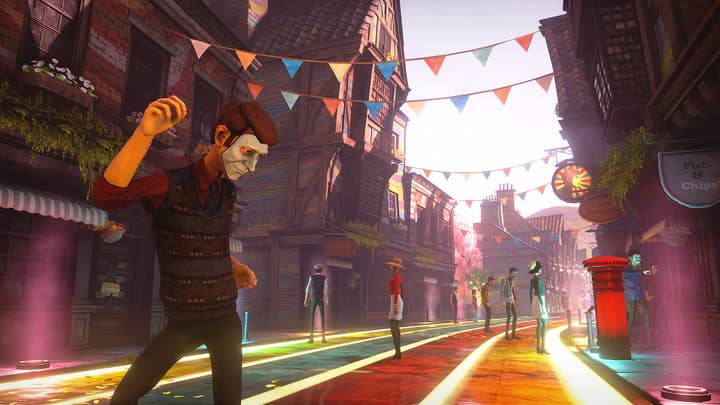We Happy Few: Critical Consensus
A lot to like and a lot to loathe, it's a mixed reaction for Compulsion Games' technicolour dystopia
When Microsoft announced the acquisition of Compulsion Games during its E3 press conference, it raised a few eyebrows.
The Canadian indie studio had one curious (though ultimately forgettable) title to its name with Contrast, but perhaps Microsoft knew something the rest of us didn't, and We Happy Few had drawn plenty of interest since its 2015 reveal.
The reality however is that the response to Compulsion's first major release is a mixed one. While critics almost universally praised its art direction, aesthetic, narrative, and character, it's plagued by optimisation issues and bugs.
On top of that, the prevailing view on the core design and gameplay is that it drags down something that would otherwise be brilliant; how much, however, varies depending on who you ask.

An open-world survival game set in a version of post-war England where the allied powers seemingly surrendered, We Happy Few sees perpetual merriment chemically administered upon its populace via a drug called Joy. Themes of tyranny of and oppression are woven throughout the fabric of the game in a way that many critics found, at times, painfully relevant to the current state of Brexit Britain and Trump's America.
As Rachel Weber noted in her 4/5 review for GamesRadar: "Its sinister version of a post-war England, of alternative facts, enforced assimilation and missing children feels particularly brutal in 2018, and once its claws are in your brain it won't let go. We Happy Few doesn't so much cut close to the bone as drill right down to the bloody marrow."
"There is a lot that I loathe about it... But for everything I dislike, there is an element of the universe and writing that grabs me by the ears."
Edwin Evans-Thirlwell, Eurogamer
However, the genre of open-world survival has become an increasingly crowded space; throw a bit of procedural generation in there too and Compulsion is hitting a lot of buttons with "In Vogue" daubed across them in neon paint.
While some critics, worn down by this cookie cutter structure, argued it impeded the otherwise delightful game, others suggested We Happy Few sits among the best and brightest of its peers.
Some critics praised its interpretation of the increasingly prevalent open-world survival concept, while others felt it was repetitive and uninspired, failing to living up to the true potential of this technicolour dystopia.
For the most part, this represents the primary criticism leveled against We Happy Few; its vibrant, twisted world hampered by tedium and drudgery in the moment-to-moment gameplay. Critics' inclination to laud it as masterpiece or little more than a curiosity seem to be entirely predicated on the individual's willingness to endure its glaring flaws.
As Edwin Evans-Thirlwell said of game's Joy mechanic in his unscored review for Eurogamer, "the possibilities are intoxicating, but the game never really delivers".
"After disliking We Happy Few in Early Access, I was half-expecting to loathe it at launch, and there is a lot that I loathe about it: the lumpy brawling, the showers of trinkets that usually amount to nothing, the branching scenarios that only make you yearn for Dishonored's vertical mazes and chaining abilities," he wrote. "But for everything I dislike, there is an element of the universe and writing that grabs me by the ears."

Brittany Vincent was more forgiving in her 8/10 review for Shack News: "In a genre that's felt stagnant for years, with copycats springing up here and there to take on the role of the 'next best thing' while simply borrowing from the greats, this trippy, disturbing take offers a wealth of new and exciting mechanics, down to the way characters look, speak, and behave."
This sentiment was echoed by Brendan Lowry in his 4/5 review for Windows Central. Praising the aesthetics and art style, he added that it strikes a "perfect balance on difficulty" culminating in an experience which is "challenging but not frustratingly so, and the result is a compelling and addicting gameplay experience"
However, Lawrence Le of Gaming Trend suggested quite the opposite, arguing in his 65/100 review that: "We Happy Few is an ambitious open-world survival game that does not benefit from being one. Tedious exploration courtesy of poorly designed environments and underdeveloped survival mechanics detract from an otherwise strong main adventure. Charming presentation, colorful writing, and powerful environmental storytelling are highlights that are unfortunately eclipsed by a shallow open world."
"So-so survival elements, the lack of mission variety, frame rate issues, prolific bugs, tedious stealth and combat will make you want to cook up some Joy for yourself"
Caty McCarthy, USGamer
Supporting this, Alex Santa Maria from Tech Raptor argued in his 6.5/10 review that We Happy Few offers a "pristine narrative vision" that "feels layered on top of a wholly different game".
"Much like the famous visage of the Wellington Wells citizenry, the story is a mask that tries to hide a buggy open world and needless procedural generation," he writes.
While frequently praised for its creativity, We Happy Few appears replete with bugs and graphical glitches that, while not ruining the experience, drag it down considerably, as emphasised by Brian Shea's 7.75/10 review for Game Informer.
"We Happy Few also suffers from technical issues, ranging from NPCs falling through the floor to showing they lack contextual awareness by yelling at you to get out of their house when you're not in a house," writes Shea. "On multiple occasions, I was in the middle of a fight and an enemy got stuck torso-deep in the floor. I never encountered any game-breaking bugs, but these problems broke the immersion on multiple occasions."
Ultimately We Happy Few evades critical consensus, positive or otherwise. The world, its characters and the story it tells appear to have been universally well-received, with Colin Campbell at Polygon saying, "it's been honed by writers and actors working together to create a coherent universe that's as frightening as any hellscape dreamed up in more lavish fantasies".
But, as summarised by Caty McCarthy in her 2.5/5 review for USGamer: "There's a lot to like about We Happy Few, with its unique psychedelic dystopian setting and well-developed story, but it's the moment-to-moment action that crashes down on you like a bad dose of Joy. So-so survival elements, the lack of mission variety, frame rate issues, prolific bugs, and tedious stealth and combat will make you want to cook up some Joy for yourself..."
Published by Gearbox Software, We Happy Few released today on PC, Xbox One, and Playstation 4.
